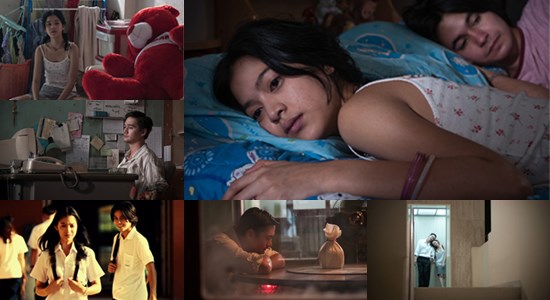
Written by Hayley Scanlon on 07 Jul 2015
Distributor Day for Night • Certificate TBC • Price N/A
Up to now, Lee Chatametikool has been best known as the regular editor on the films of Apichatpong Weerasethakul (Uncle Boonmee, Tropical Malady) but with Concrete Clouds he’s finally stepped out of the edit suite and behind the camera to direct his very first feature film. However, Concrete Clouds owes less to Apichatpong Weerasethakul or any of the other well-known Thai directors he’s been working with over the last decade than it does to early period Tsai Ming-Liang and the Taiwanese new wave. A mood piece heavy on directorial flair but light on detail, Concrete Clouds never quite comes together but still manages to offer a few rewards for the patient viewer.
Set in 1997 just as the Asian Economic crisis begins to take hold, long time emigré Mutt (Ananda Everingham) gets a late night phone call from his high school age brother to say their father has just jumped off the roof. Mutt goes home for the first time in a long while aiming to lay a few ghosts to rest - less that of his father than that of his teenage self and half-forgotten love. Meanwhile, younger brother Nic has formed a tentative romance with a girl from the next building who appears to be living more or less alone and has just begun working in a hostess club. Just like his brother he’ll have to decide whether to abandon his love in Thailand to seek new dreams overseas or chase an ever elusive future in the land of his birth.
To be frank, the somewhat shocking and early death of the father retains little impact after the fact as neither of the now orphaned sons seems to dwell very long on the loss of their only parental figure and there’s no real soul searching over why he did what he did. The blueprints for new buildings he was looking at right before and the constant financial concern on the news screens seem to be evidence enough of his ultimate motives. Neither is much mention made of the absent mother who, one assumes, has been absent for a relatively long time. The age gap between the brothers also means that their relationship is not as close as you might assume brothers to be, as Mutt must have left for America when Nic was little more than a toddler. Nevertheless, both boys are cast adrift by the older man’s decision, taken alone and with seemingly little concern for those around him.
The historical context is fairly key to the film, though it may be impenetrable for those less versed in recent history. In setting the story in 1997, the director intends both to imply that many of Thailand’s present social and economic problems stem back to the Asian Financial Crisis and the new Thai constitution which was created around that time, but also to deal with the fragile nature of memory and our own tendencies to over-romanticise our pasts by falling in love with a fantasy of our own creation. Mutt has dreamed of his high school girlfriend, Sai, ever since leaving her to go to college in America. He lives with a woman in New York but their relationship doesn’t seem particularly serious and she has not accompanied him to Thailand for his father’s funeral. Even though years have passed he’s remained faithful to the image of Sai he has in his mind, and however much he tells himself nothing has changed it’s his own self-created image that he’s wedded to rather than the flesh and blood Sai who’s been busy getting on with her own life in the intervening ten years.
In another cloud based film, Mikio Naruse’s Floating Clouds, the title refers to the the central characters who are unable to re-root themselves after the disruption caused to their lives, firstly in failed Manchurian expedition and then by the after-effects of the war. They float aimlessly trying to find something they can cling on to that will allow them to move forward with their lives and ultimately never find it. In Concrete Clouds it’s almost the opposite problem - the characters are weighed down by their dreams, almost crushed by them and unable to move. Their dreams will never lift off the ground because they can’t bear to let go of the past; of the people they once were and things they once thought they wanted.
The most notable element of Concrete Clouds is its unusual shooting style which incorporates everything from snatches of archival footage to long stretches of fantasy sequences played out as karaoke videos to late ‘90s Thai pop songs. The film has an interesting aesthetic which appropriately matches its melancholy and slightly wistful tone, though it fails to capture the exact emotional ache that it seems to be going for. Ultimately its disparate elements never quite seem to coalesce into something more and though Concrete Clouds has plenty to admire it stops short of capturing the heart. Nevertheless it's an impressive debut from Lee Chatametikool who has marked himself out as new talent to look out for in Thai cinema.
Concrete Clouds was screened as part of the London Thai Indie Fest in 2015 on 1st July at Regent Street Cinema with an in person Q&A with director Lee Chatametikool and is distributed in the UK by Day For Night.
posted by Richard Durrance on 12 Feb 2026
posted by Richard Durrance on 10 Feb 2026
posted by Richard Durrance on 07 Feb 2026
posted by Richard Durrance on 03 Feb 2026
posted by Richard Durrance on 27 Jan 2026
posted by Richard Durrance on 19 Jan 2026
posted by Richard Durrance on 08 Jan 2026
posted by Richard Durrance on 17 Dec 2025